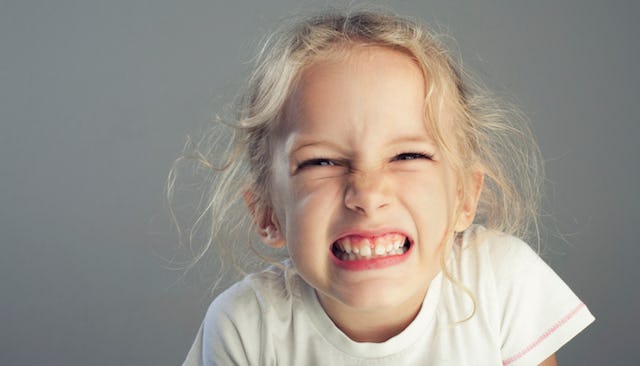The Shame Of Having A Biter

They’re the words no mother wants to hear from a teacher: “Can I talk to you for minute…in private?”
My daughter stays in the supervised playroom as I obediently follow the preschool teacher out the door. The other parents and their 2-year-olds walk by, chatting happily, as I stand nervously with my back against the wall, wedged between a rollaway gardening container and a squeaky tricycle.
“There was a biting incident today,” says the teacher. The sympathetic look on her face tells me it was my kid who did the biting before she breaks the news.
I stand there like an idiot, knowing I should say something but I’m too flustered to speak. My third and youngest child is the first of my kids to ever bite someone. It takes me a minute to realize that what I’m feeling goes beyond the embarrassment, say, of having one of them meltdown in the toy aisle of Target. It’s also more than just plain shock, although there’s plenty of that. Finally, and without a doubt, I quietly identify the source of my flushed cheeks and tied tongue: shame.
How am I the parent of a biter? What am I doing wrong?
There are moments in parenting when you feel like no matter how awesome a parent you’ve been up until then, you now totally suck because your beloved offspring does the unthinkable. There are, of course, different “unthinkables” for different ages, but during the preschool years, biting is right up there with eating dog poo.
Never mind that my daughter is super loving, knows when to say “please” and “thank you,” is pretty good at sharing, and eats all her broccoli. She now will be known simply as The Biter — and I will be known as The Biter’s mom.
When your kid bites, it feels like the ultimate parenting fail. We often internalize our kids’ behavior as a referendum on our parenting. One misstep by our children — a forgotten “thank you,” an unkind word, or worse, a set of teeth sunk into an arm — and we blame ourselves for not being good enough parents. Like all kids, my girls have done and said plenty of things I’ve taught them not to.
As a seasoned mom, I know that when their behavior goes off the grid, it means they’re having a hard time regulating their feelings or they’re testing boundaries. Basically, they’re overwhelmed and frustrated by emotions or a sticky situation.
Rationally, I know biting is a physical manifestation of toddler frustration. I mean, think about it: You’re a mini human in the midst of mastering language, social interactions, potty training, sleeping through the night, and reasonable eating habits. You have a lot going on, and some days you just can’t keep it together. Some days, you think, Screw diplomacy! I’m using my canines! According to the American Psychological Association, biting is a normal developmental behavior for children ages 3 and under.
Wonderful. That doesn’t make me feel any better, and I bet the mom of the kid my daughter bit feels the same way.
Rational explanations cannot compete with the social standards we set for ourselves and our kids. We’re constantly striving for good, better, best, and we expect the same from the parents around us. For the most part, I’ve found that when my kid misbehaves, people who are deep in the parenting trenches get it.
Biting, however, is in a class of its own. We want our children, even the very young ones, to act like civil humans, not wild animals. However, preschoolers often resemble hungry bear cubs more than acceptable members of society.
Face flushed, I finally find my words and stammer out an apology to the teacher. I tell her we’re vigilant with our kids about using their words to communicate. I need her to believe I’m a good and caring mom. I want to explain that my bright, boisterous, super-social 2-year-old is not mean-hearted. Hesitantly, I ask the teacher how it happened. Was my daughter provoked? I want to rush to my little girl’s defense — and my own.
Here’s what she tells me: While lining up to leave the classroom, the girl behind my daughter accidentally pushed her. When she stumbled, the girl in front of her shoved her back. Frustrated, she used her teeth instead of her words to express her discontent.
At least there’s a reason for what she did, but that doesn’t make it OK or wipe away the shame I feel.
I go back into the classroom to collect my girl. She’s building a teetering tower, clapping with each new block carefully stacked.
“Mama!” she squeals, burying her face in my leg. “I was sad today.”
“I know you were, honey,” I say, stroking her head.
As guilty as I feel about what she did, I don’t want to transfer any of my shame onto her. She’s just a sweet 2-year-old, busy becoming who she is. It’s a process that takes time, trial and error, and lots of practice. My job is to coach her with kindness and help her make better decisions.
As for me, I hope the apology call I need to make to the other child’s mom goes well. A little forgiveness from another parent can help us be a little easier on ourselves.
This article was originally published on